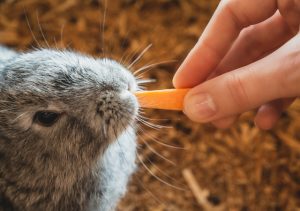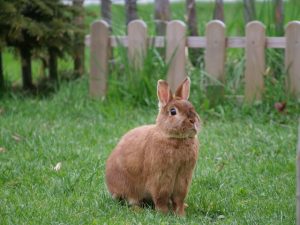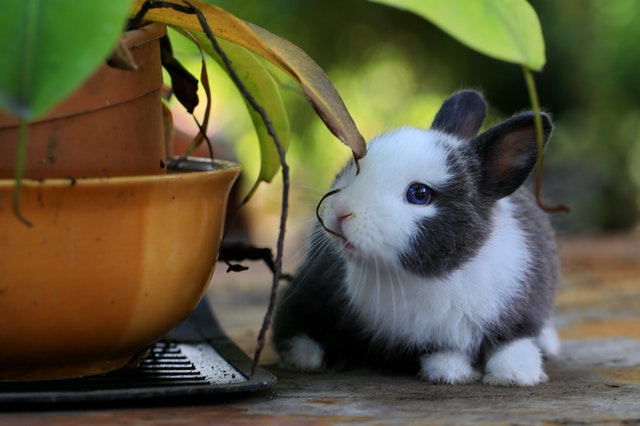
Rabbits are herbivores, meaning they eat plants. Your pet rabbit may be an animal, but it still needs to have a proper diet on a daily basis. Rabbits cannot eat all foods that are plants. They also will not eat meat. In the wild, a rabbit generally knows what to avoid eating and what is safe to eat.
Contents
When a rabbit is born and raised in captivity, does it still have that innate instinct of safe over harmful? For the most part, your furry friend is going to rely on you for the foods he or she eats. You are the keeper, you are the parent, so to speak. It is your responsibility to be sure that your rabbit has a healthy diet each and every day.
A rabbit, especially in the wild, is considered to be a grazer. This means that they eat continuously. They do not have meals brought to them after school or after work. They scrounge for their own food. Luckily, your rabbit does not have that issue. He or she can rely on you to bring him his daily meals.
The rabbit also has a complex digestive system that allows it to process foods it eats in a very efficient manner. A rabbit also has special dietary needs. For instance, you cannot introduce new foods daily to your rabbit.
It is much wiser to try a new food for a day or two unless there is an obvious issue, and then wait a few days before trying the next food. Although a rabbit is efficient at digesting its food, you still need to be sure that there are no side effects or other issues with the first new food before trying another.
Main Diet
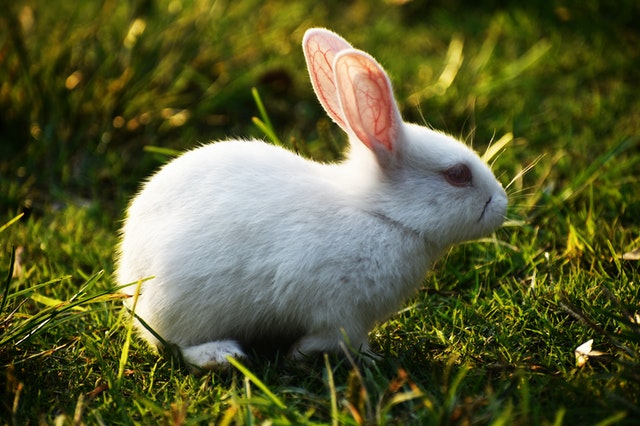
It has already been stated that a rabbit needs good quality hay daily. Timothy hay is what is most often suggested. The rabbit’s daily diet should be 80% Timothy hay, 10% leafy greens, 5% fruits, and vegetables, and 5% rabbit kibble.
There are sound reasons for this division the way it is. To begin with, Rabbits are wild creatures, they still have the instincts of a wild rabbit. They need to have the hay with the best fiber, the hay that is best for chewing on to keep the teeth from growing awkwardly. Kibble is to supplement all the other foods to ensure that all nutrients and Vitamins are met.
Fruits and vegetables are a type of treatment for rabbits. Having leafy greens is beneficial for health and digestion. It does need to be noted that a rabbit should not be fed Alfalfa hay. There is too much protein and calcium in Alfalfa.
Feeding pellets should be limited also. Too much of a good thing can lead to obesity, even for rabbits. This is true no matter what foods you choose to feed your rabbit.
Along with a good, daily diet, a rabbit needs room to roam, and a place to exercise. This is why a closed-in kennel run is such a good idea for rabbits. The run will give them space to hop and move about. Putting small piles of hay inside the kennel will also help to make the rabbit feel safe if it sees or senses a predator around.
A rabbit will burrow under the hay pile. Hopping and exercise are recommended for all rabbits versus being kept in a rabbit cage all the time. This will help them to burn calories.
Not to be too confusing, if a rabbit needs supplemental food, leafy greens are the sole choice to feed extra daily. Vegetables can be given in additional small amounts also, as long as they are not high in carbohydrates. Again, monitor closely for reactions to new foods given. A rabbit could develop gas pains, diarrhea, or just soft feces.
Remember small amounts and take some time in between feeding new foods. If you do not wait in between the new food, it will be difficult to know what it was that caused your rabbit the problem. Remember also, ‘Bugs Bunny’ was just a cartoon! Rabbits do not eat carrots the way Bugs did. Matter of fact, carrots are not recommended as more than just a tiny amount.
Preferred and Best Foods
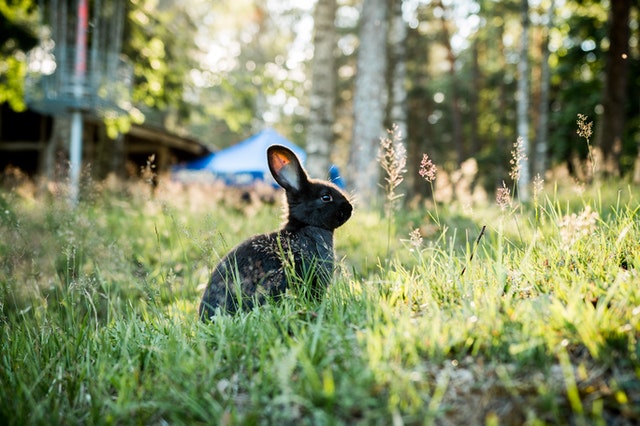
Dark leafy greens are the best choice. These will include some such as but are not limited to just these.
- Bok choy
- Carrot tops
- Kale
- Romaine lettuce
- Mustard Greens
The dark leafy greens that should be given in very limited quantities include, but are not limited to:
- Parsley
- Collards
- Dandelion Greens
- Swiss Chard
All of these are higher in calcium and could cause kidney stones to develop in your rabbit. For baby rabbits, since their little bodies need the extra calcium and protein, they can be fed alfalfa pellets and alfalfa hay. Those two contain higher amounts to enable the rabbit to grow strong bones and muscles.
Fruits
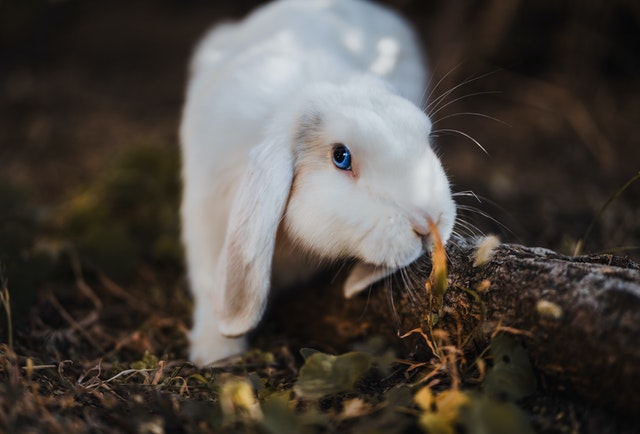
As stated, fruits can be given. However, it must be in limited quantities, every 1 to 2 days. The amount given to a rabbit every 1 to 2 days should be no more than 2 tablespoons of high fiber, fresh fruit such as pear, berries, or apples.
Other Treats
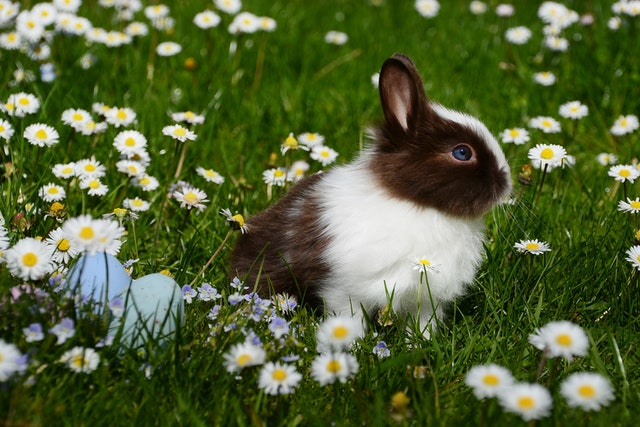
I am sure you are wondering if it is okay to give other sorts of treats. Your rabbit may appear hungry and as though he is asking for food when you sit with him and are eating. There are certain foods that are not good to give to any rabbit at any time. These will include bread, grains, cookies, seeds, and nuts.
One thing that a rabbit should have more than enough of daily is a freshwater supply. The water should be changed out or filled often throughout the day. Imagine if you had to drink the water, you would want it fresh also.
Disgusting Behavior
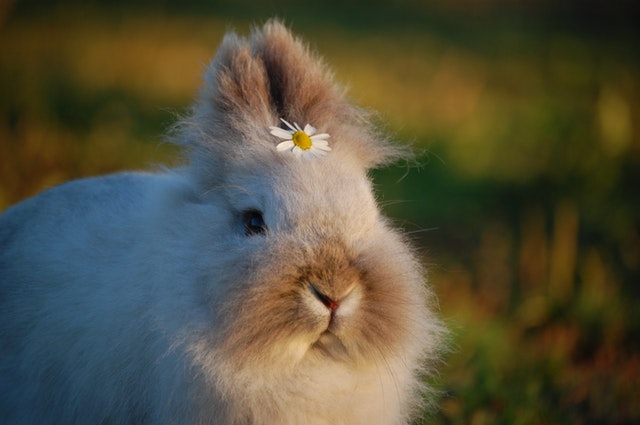
If you happen to see your rabbit doing this, do not panic. It is normal for a rabbit. It does not mean that your rabbit is so hungry he is eating his own feces. The rabbit will do this only at night and the pellets they consume are different from those normally seen by the owners or human parents.
These pellets are filled with Vitamins B and K and loaded with protein. Just remember if you happen to see it, it is completely normal and actually very beneficial for your rabbit’s health.
Toys
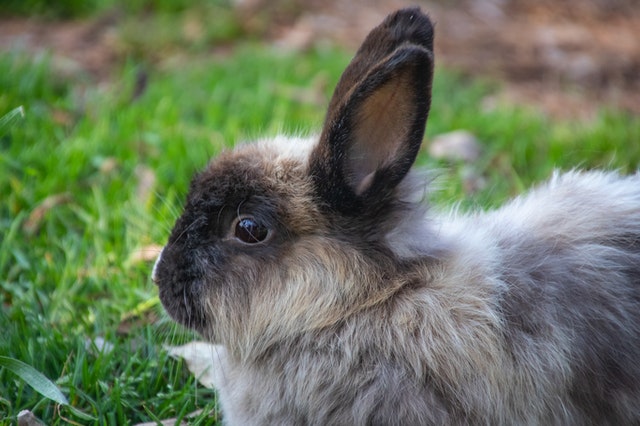
It is also extremely beneficial to find toys that your rabbit likes to chew on. Obviously, it must be ones that are safe to chew on also. The reason that rabbits chew on so many things is to keep their teeth from growing out of control.
The gnawing on the hay and chewing toys help to wear down the teeth. If the rabbit does not do enough gnawing or chewing, his teeth will grow out and you will need to take him to the vet or a specialist who can grind the teeth down for the rabbit.
Social
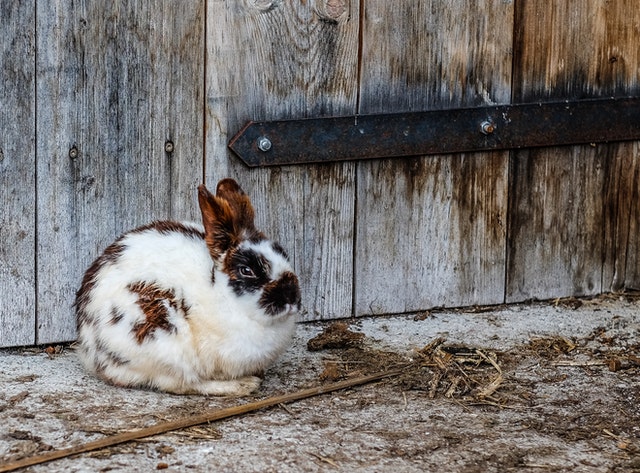
Your rabbit is a social creature. Normally rabbits will live in groups. If you have a solitary rabbit, they may become lonely and despondent. This can happen even if you sit with your rabbit for a short time each day.
Do not get me wrong, playing or talking to your rabbit will help stave off the loneliness to an extent, but not entirely. Just as humans need other humans, rabbits also like to socialize with their kind. If at all possible, try and have a pair of rabbits.
If you choose to not allow them, babies, there are surgical options. This will prevent unwanted litter. However, your rabbit wants and needs a friend. You may be a great one, but you are not quite the same.
Things To Keep In Mind
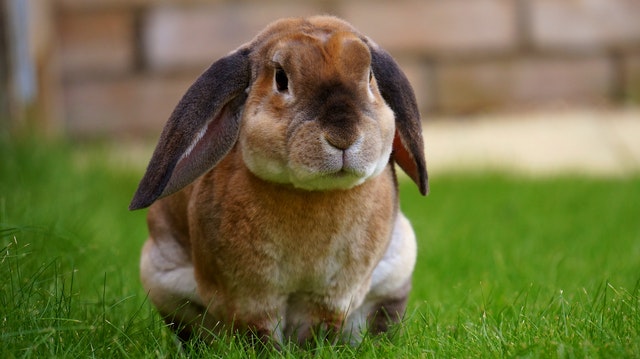
Your rabbit’s digestive system is delicate. In order to keep their digestive system at optimum health levels, they need to eat frequently. However, rabbits do not know or realize when it is time to stop eating. So, as the owner, they need you to limit the quantities each time you feed him or her. They can have Timothy hay throughout the entire day, which is beneficial to their digestive tract and also their dental needs.
Many rabbits have become accustomed to unlimited amounts of pellets throughout the day. This will stop them from chewing and eating the Timothy hay. You may have a challenge on your hands when you need to limit the kibble and increase the Timothy hay. Stick to your guns. How much hay is okay to give them varies per the rabbit. Throughout the entire day, they should have a ball that is twice the size of the rabbit himself.
If you want to treat your rabbit with fresh greens daily stick with the ones mentioned above. Romaine, Bok Choy, Carrot tops, or broccoli leaves. Do not feed the broccoli to your rabbit. The broccoli florets could easily cause gas for your rabbit, which will put him or her in some nasty pain.


